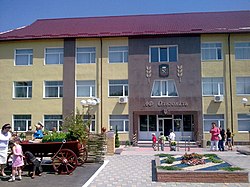Olhopil, Vinnytsia Oblast
Olhopil
Ольгопіль | |
|---|---|
Village | |
 | |
| Coordinates: 48°11′47″N 29°29′47″E / 48.19639°N 29.49639°E | |
| Country | Ukraine |
| Oblast | Vinnytsia Oblast |
| Raion | Haisyn Raion |
| Hromada | Olhopil rural hromada |
| First established | 1780 |
| Population (1926) | |
| • Total | 2,172 |
Olhopil (Ukrainian: Ольгопіль) is a village in Haisyn Raion of Vinnytsia Oblast, Ukraine.
First known since 1780 as Rohuzka Chechelnytska (Ukrainian: Рогузка Чечельницька or Рогузки-Чечельницькі) it was a border town between the Polish–Lithuanian Commonwealth and Budjak Horde.[citation needed] In 1795 it was renamed Olgopol (Russian: Ольгополь) by Catherine II in the name of her granddaughter, Olga Pavlovna. It was also known as Holopol.[1] In Imperial Russia it used to be a small town, the center of Olgopol uyezd of Podolia Governorate.
Before the 1917 Revolution, Olgopol (also, spelled Olhopil) was a district town in the province of Podolia. The Jewish population in 1847 was 247; by 1897 the number had increased to 2,473.
Olgopol suffered heavily in 1919 at the hands of the Ukrainian bands which were active in the surroundings. Jews were also attacked by the armies of Anton Ivanovich Denikin). In 1926 the Jewish population numbered 1,660 (76.4% of the total). At the time of the German-Romanian occupation (July 1941), most of the Jews fled from the townlet, which was incorporated into the zone annexed by the Rumanians (Transnistria). The Jews who remained were concentrated into a ghetto together with about 600 Jews who had been expelled from Bessarabia and Bukovina, all of them being submitted to forced labor in the vicinity.[2]
Population
[edit]Language
[edit]Distribution of the population by native language according to the 2001 census:[3]
| Language | Percentage |
|---|---|
| Ukrainian | 98.5% |
| Russian | 1.3% |
| other/undecided | 0.2% |
Notable people
[edit]- Nataliya Polovynka (born 1965), singer and actress
References
[edit]- ^ Mikhail Levchenko. Hanshchyna (Ганьщина Україна). Opyt russko-ukrainskago slovari︠a︡. Tip. Gubernskago upravlenii︠a︡, 1874.
- ^ Kessler, Arthur (2024). Spitzer, Leo (ed.). A Doctor's Memoir of the Romanian Holocaust: Survival in Lager Vapniarka and the Ghettos of Transnistria. Rochester Studies in East and Central Europe. Rochester NY: University of Rochester Press. pp. 99–154. ISBN 978-1-64825-093-4.
- ^ https://socialdata.org.ua/projects/mova-2001/ [bare URL]
Bibliography
[edit]- This article incorporates text from a publication now in the public domain: . Brockhaus and Efron Encyclopedic Dictionary (in Russian). 1906.



